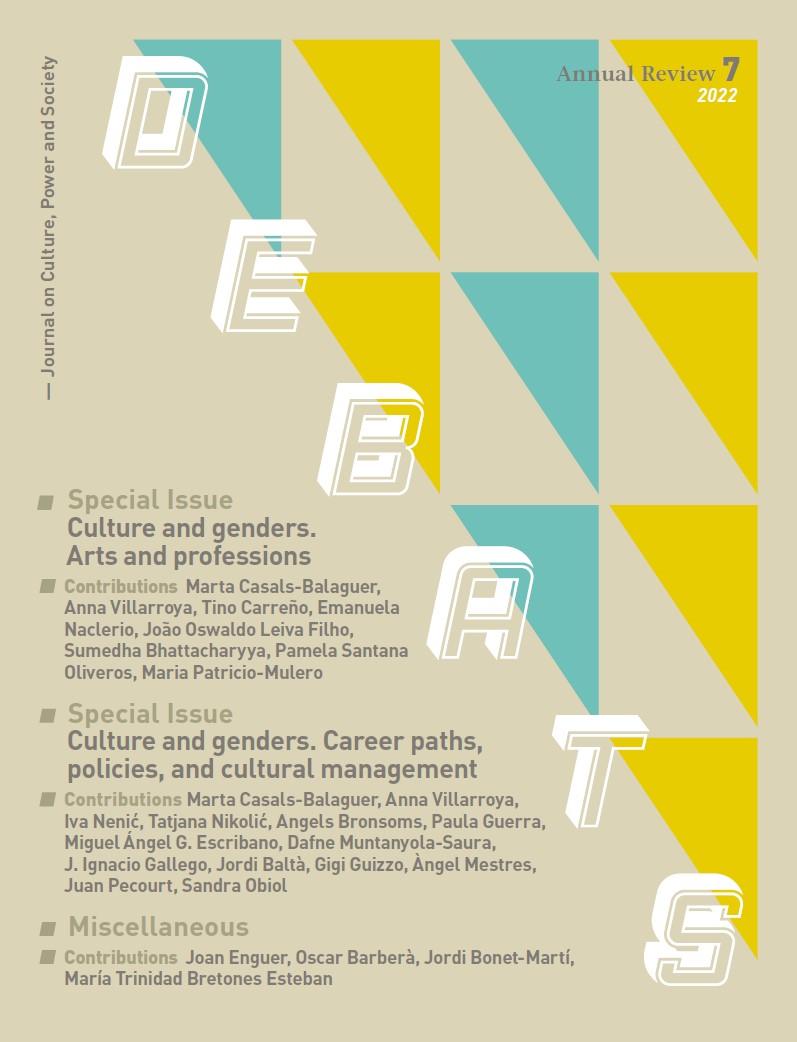Dancing in the street as feminist empowerment: the choreographic discourse of the BellyWarda and L’Armée des Roses collectives
Resumen
The reaffirmation of female bodies in public spaces is a constant in feminist social movements. Indeed, the role of the female body in public spaces and conveying a social message is vindicated by artists from all disciplines, whether by occupying the streets in protest of unequal women’s rights and equality or sexual harassment and rape, or in other social demonstrations. In the field of dance, some companies perform expressly in public spaces with the precise aim of conquering these arenas as a stage to make female bodies visible, highlighting their diversity and demanding more equality and freedom. In this article, we use collective interviews with two French companies committed to promoting feminism in the streets BellyWarda (FatChanceBellyDance©) and L’Armée des Roses (performing the cancan), to analyse the choreographic discourse related to this concept. The study examined the appropriation of public spaces, interactions with the public at large and their reception of these performances, social links between dancers, and the transmission of feminist values. Observation of these dances and the interview outcomes was addressed from the perspectives of the sociology of emotions, phenomenology of urban spaces, and women’s studies. The context of the COVID-19 pandemic prevented an analysis of the public
reception of these street actions, but the ongoing situation in France in which dance was considered a ‘nonessential cultural asset’ during the second lockdown (when this research took place), was discussed.
Descargas
Citas
Atkinson, P., y Duffy, D. M. (2019). Seeing movement: Dancing bodies and the sensuality of place. Emotion, Space
and Society, 30(noviembre 2017), 20–26. https://doi.org/10.1016/j.emospa.2018.12.002
Bernard, C. (2021). Il y a longtemps que l’administration de la culture a emprunté en France les chemins du dédain
et de la méconnaissance. Le Monde. Consultado desde https://www.lemonde.fr/idees/article/2021/01/12/
il-y-a-longtemps-que-l-administration-de-la-culture-a-emprunte-en-france-les-chemins-du-dedain-et-de-lameconnaissance_
_3232.html
Casey, E. S. (1993). Getting Back into Place: Toward a Renewed Understanding of the Place-World. Indiana.
Casey, E. S. (2020). Emotion at the edge. Research in Phenomenology, 50(3), 291–299. https://doi.org/10.1163/15691640-
Elkin, L. (2016). Flâneuse. Una paseante en París, Nueva York, Tokio, Venecia y Londres. Barcelona: Malpaso.
Gisbert, V., y Rius-Ulldemolins, J. (2019). Women’s bodies in festivity spaces: feminist resistance to gender violence
at traditional celebrations. Social Identities, 25(6), 775–792. https://doi.org/10.1080/13504630.2019.1610376
Goffman, E. (1959). The presentation of self in everyday life. Garden City: Double Day.
Kern, L. (2021). Ciudad feminista. Barcelona: Bellaterra Edicions.
Lefebvre, H. (1968). El derecho a la ciudad. Madrid: Capitán Swing.
Lhortolat, E. (2014). L’American Tribal Style (ATS) : le contre-pied à l’image fantasmée de la danseuse orientale de
à aujourd’hui. Loxias Colloques: Images de l’Oriental dans l’art et la littérature. Niza. Consultado desde http://
revel.unice.fr/symposia/actel/index.html?id=877
Lissagaray, P.-O. (2021). Las parisinas. En Historia de la comuna de París de 1871. Madrid: Capitán Swing.
Maruta, N. (2014). L’incroyable histoire du cancan. París: Parigramme.
Muntanyola Saura, D. (2016). La force des liens en danse : une étude du regard dansé. Sociologie de l’Art, 25–26,
–103. https://doi.org/10.3917/soart.025.0083
Scheff, T. J. (1988). Shame and Conformity: The Deference-Emotion System. American Sociological Review, 53(3),
–406.
Scribano, A. (2013). Sociología de los cuerpos/emociones. Revista Latinoamerica de Estudios Sobre Cuerpos, Emociones
y Sociedad, 10(año 4, diciembre de 2012-marzo de 2013), 93–113.
Turner, J. H. (2009). The sociology of emotions: Basic theoretical arguments. Emotion Review, 1(4), 340–354. https://
doi.org/10.1177/1754073909338305
Turner, J. H., y Stets, J. E. (2005). The Sociology of Emotions. Nueva York: Cambridge University Press.
Descargas
Publicado
Cómo citar
Número
Sección
Licencia
Sin perjuicio de lo dispuesto en el artículo 52 de la Ley 22/1987 de 11 de noviembre de Propiedad Intelectual, BOE del 17 de noviembre de 1987, y conforme al mismo, los autores o autoras ceden a título gratuito sus derechos de edición, publicación, distribución y venta sobre el artículo, para que sea publicado en Debats. Revista de cultura, poder y sociedad.
Debats. Revista de cultura, poder y sociedad se publica bajo el sistema de licencias Creative Commons según la modalidad «Reconocimiento - NoComercial (by-nc): Se permite la generación de obras derivadas siempre que no se haga un uso comercial. Tampoco se puede utilizar la obra original con finalidades comerciales».
Así, cuando el autor o autora envía su colaboración, acepta explícitamente esta cesión de derechos de edición y de publicación. Igualmente autoriza a Debats. Revista de cultura, poder y sociedad, la inclusión de su trabajo en un fascículo de la revista para que se pueda distribuir y vender.











